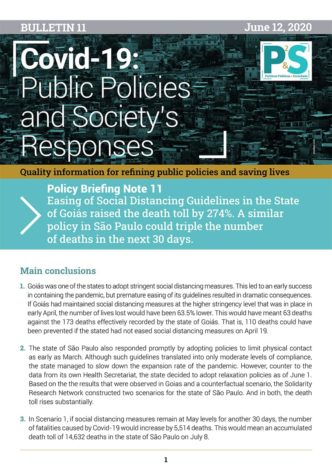Main conclusions
- Goiás was one of the states to adopt stringent social distancing measures. This led to an early success in containing the pandemic, but premature easing of its guidelines resulted in dramatic consequences. If Goiás had maintained social distancing measures at the higher stringency level that was in place in early April, the number of lives lost would have been 63.5% lower. This would have meant 63 deaths against the 173 deaths effectively recorded by the state of Goiás. That is, 110 deaths could have been prevented if the stated had not eased social distancing measures on April 19.
- The state of São Paulo also responded promptly by adopting policies to limit physical contact as early as March. Although such guidelines translated into only moderate levels of compliance, the state managed to slow down the expansion rate of the pandemic. However, counter to the data from its own Health Secretariat, the state decided to adopt relaxation policies as of June 1. Based on the the results that were observed in Goias and a counterfactual scenario, the Solidarity Research Network constructed two scenarios for the state of São Paulo. And in both, the death toll rises substantially.
- In Scenario 1, if social distancing measures remain at May levels for another 30 days, the number of fatalities caused by Covid-19 would increase by 5,514 deaths. This would mean an accumulated death toll of 14,632 deaths in the state of São Paulo on July 8.
- In Scenario 2, with the easing of social distancing measures announced at the beginning of June, the estimate is that COVID-19 deaths will increase by rise by 15,798. In other words, three times higher than the estimated 5,514 deaths if social distancing continued at May levels. Taking the situation in Goiás as reference, the total death toll in São Paulo could reach 24,986 by July 8.
Work group responsible
Coordination: Lorena Barberia.
Researchers:
- Natália de Paula Moreira (USP)
- Maria Letícia Claro de F. Oliveira (USP e CEPESP/FGV)
- Luiz Guilherme Roth Cantarelli (USP)
- Isabel Seelaender (USP)
- Marcela Mello Zamudio (USP e CEPESP/FGV)
- Pedro Schmalz (USP e CEPESP/FGV)


